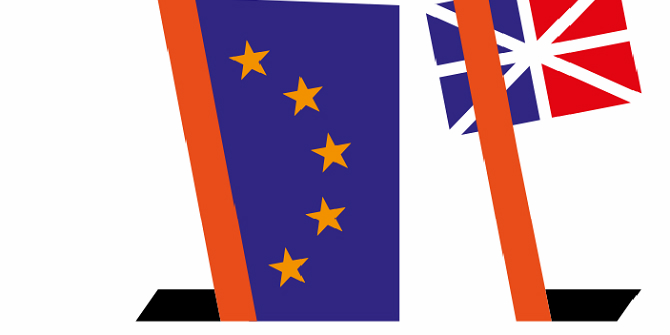
To make an informed decision on the merits of leaving the European Union (EU), UK voters need to know more about what the government would do following Brexit. Just as the parties put forward policy manifestos in the run-up to an election, they should publish their plans for a post-Brexit world before the referendum.
The report notes that it is highly uncertain what the UK’s future would look like outside the EU — which makes ‘Brexit’ a leap into the unknown — and reviews the advantages and drawbacks of the most likely options. Among their findings:
- After Brexit, the EU would continue to be the world’s largest market and the UK’s biggest trading partner. A key question is what would happen to the three million EU citizens living in the UK and the two million UK citizens living in the EU.
- There are economic benefits from European integration, but obtaining these benefits comes at the political cost of giving up some sovereignty. Inside or outside the EU, this trade-off is inescapable.
- One option is ‘doing a Norway’ and joining the European Economic Area (EEA). This would minimise the trade costs of Brexit, but it would mean paying about 83 percent as much into the EU budget as the UK currently does. It would also require keeping current EU regulations (without having a seat at the table when the rules are decided).
- Another option is ‘doing a Switzerland’ and negotiating bilateral deals with the EU. Switzerland still faces regulation without representation and pays about 40 percent as much as the UK to be part of the single market in goods. But the Swiss have no agreement with the EU on free trade in services, an area where the UK is a major exporter.
- A further option is going it alone as a member of the World Trade Organization (WTO). This would give the UK more sovereignty at the price of less trade and a bigger fall in income, even if the UK were to abolish tariffs completely.
- Brexit would allow the UK to negotiate its own trade deals with non-EU countries. But as a small country, the UK would have less bargaining power than the EU. Canada’s trade deals with the United States show that losing this bargaining power could be costly for the UK.
- A vote in favour of Brexit would fire the starting gun on a two-year renegotiation of the UK’s place in Europe and the world. If the UK opts to cut ties with the rest of Europe, this renegotiation could fundamentally change the political, economic and legal foundations of UK life that have built up since the country joined the EU in 1973. Alternatively, if the UK chooses to remain part of the EEA, the economic and legal changes would be much smaller.
- During the renegotiation, the UK would face an unavoidable trade-off between economic benefits and political sovereignty. The UK benefits from closer economic integration with the EU, but the price for this integration is allowing the EU control over some areas of policy. Leaving the EU will not free the UK from this fundamental trade-off.
At present, there is no consensus within the government or the public over what should follow Brexit. This reflects the fact that all of the alternatives to EU membership have their own drawbacks and would impose costs on the UK economy. The alternative scenarios embody very different visions of the UK’s future place in the world. The country’s voters have the right to know what they are choosing between when they enter the polling booth.
♣♣♣
Notes:
- This article was originally posted on LSE’s Brexit blog and is based on the authors’ paper Life after BREXIT: What are the UK’s options outside the European Union?, the first in a series of briefings by LSE’s Centre for Economic Performance (CEP) analysing the economic costs and benefits of Brexit for the UK.
- This post gives the views of its authors, not the position of LSE Business Review or the London School of Economics.
- Featured image credit: DesignRaphael Ltd, for CEP.
 Swati Dhingra is an Assistant Professor at the Department of Economics at LSE. Before joining LSE, Swati completed a PhD at the University of Wisconsin-Madison and was a fellow at Princeton University. Her research interests are international economics, globalisation and industrial policy. Her work has been published in top economic journals including The American Economic Review. She is Associate Editor of the Journal of International Economics, and was awarded the FIW Young Economist Award and the Chair Jacquemin Award by the European Trade Study Group for her work on firms and globalisation. Swati is a member of the Globalisation group at the LSE’s Centre for Economic Performance, and has made regular contributions to work on economic policy.
Swati Dhingra is an Assistant Professor at the Department of Economics at LSE. Before joining LSE, Swati completed a PhD at the University of Wisconsin-Madison and was a fellow at Princeton University. Her research interests are international economics, globalisation and industrial policy. Her work has been published in top economic journals including The American Economic Review. She is Associate Editor of the Journal of International Economics, and was awarded the FIW Young Economist Award and the Chair Jacquemin Award by the European Trade Study Group for her work on firms and globalisation. Swati is a member of the Globalisation group at the LSE’s Centre for Economic Performance, and has made regular contributions to work on economic policy.
 Thomas Sampson is an Assistant Professor in the Department of Economics at LSE. He holds a PhD in Economics from Harvard University and an MSc in Econometrics and Mathematical Economics (with distinction) from LSE. He has worked as a consultant to the World Bank, a fellow of the Bank of Papua New Guinea and other organisations. He has published papers in a number of leading academic journals. His research interests are in international trade, growth and development.
Thomas Sampson is an Assistant Professor in the Department of Economics at LSE. He holds a PhD in Economics from Harvard University and an MSc in Econometrics and Mathematical Economics (with distinction) from LSE. He has worked as a consultant to the World Bank, a fellow of the Bank of Papua New Guinea and other organisations. He has published papers in a number of leading academic journals. His research interests are in international trade, growth and development.





